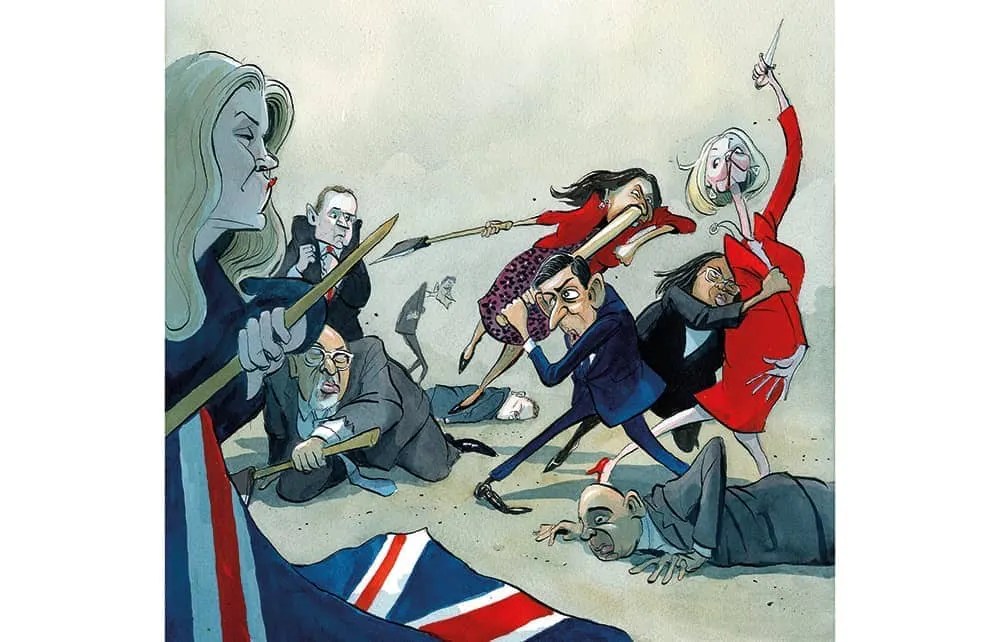The UK government has had a fractious couple of weeks. First it was the Swiss EU deal rumours, then housing, then a panicked response to high immigration figures. The latest problem to crop up is a rebellion over onshore wind, which has effectively been banned in the UK since 2012. What each of these disparate issues have in common is that they fall within the scope of what is increasingly the most important political debate in the UK. This is the extent to which the government should prioritise economic growth, and, implicitly, who the country is run for.
Onshore wind and immigration are perhaps the clearest examples of this. The restrictions on wind turbine development, which currently make new developments effectively impossible, defy logic. If you’re in the middle of an energy crisis and you also have a formal commitment to net zero, not to mention a small-c conservative preference for not interfering in peoples’ lives, banning turbines because you think they look ugly makes little sense. This is why a move from Simon Clarke, a former cabinet minister, joined by both Boris Johnson and Liz Truss, to reverse the ban has gained so much momentum. It now looks like the government will have to give in to the rebels and do something about onshore wind.
On immigration, the problem the government faced was that net migration, which they committed to reducing, had in fact increased, to more than 500,000 per year. This was mostly because the British government issued more student visas, as well as popular one-off settlement schemes for Ukrainians and Hong Kongers. A rational response would have been to treat the figures for what they were, a likely one-off, and to point out that most non-UK students leave the country after completing their degrees. Instead, they panicked, and came up with a plan to reduce the number of student visas for so-called low-quality degrees. This plan fell apart quickly thanks to internal opposition, which sprung up because of the key role foreign students, who pay exorbitant fees to study in the UK, play in funding the higher education sector.
In both cases, government policy aimed at placating core voters ran into opposition because of the impact it would have on economic growth. In previous years, with a stronger prime minister than Rishi Sunak, these policies would have probably either gone through or stayed intact. But instead, they have been forced to back down. This is also the result of what will perhaps be the longest-lasting effect of Liz Truss’s premiership. Truss’s own failed push for a pro-growth agenda violently threw the Conservatives out of their policy consensus towards a debate over whether they are in fact the so-called anti-growth coalition themselves, and at risk of turning into a party for pensioners. The last point was one Clarke himself addressed when he expressed his opposition to a push from some other Conservative MPs to scrap house-building targets.
This is a debate that will get more intense next year, because it will become more focused on Brexit. Sunak’s government still plans to sunset most EU-derived legislation in the UK by the end of 2023 under the retained EU law bill, which he inherited from Johnson. The bill itself is emblematic of the Conservatives’ approach to Brexit so far: diverging from the EU as much as possible without really knowing what they want to achieve by doing it.
That lack of a Brexit strategy is having a corrosive effect on Brexit’s popularity. YouGov polling data now show 56 per cent saying it was wrong to leave the EU compared to 32 per cent saying it was the right thing to do. One in five leave voters surveyed have changed their minds. Against this backdrop, trying to pass what is essentially a Brexit poison pill, without having a clear and detailed alternative regulatory framework in place, will not go down well. There’s a risk that the bill will leave large gaps in the UK’s legal framework, which we expect to alarm both some backbenchers and the House of Lords.
The debate will not go away under a Labour government. Rather than presenting a concrete strategy of their own, Labour have played an opportunistic game, criticising the Conservatives when they come up with an obviously unpopular policy but not deviating on the fundamentals. Sir Keir Starmer has committed to staying out of the EU’s single market and customs union, and to reducing net migration. There is, as far as we can tell, no big Labour plan for housing. While in opposition, Labour can keep putting pressure on the Conservatives while still largely supporting the same policies. But, should they end up in government, that will no longer work.
A version of this article first appeared in the Eurointelligence morning news briefing. Sign up here






Comments